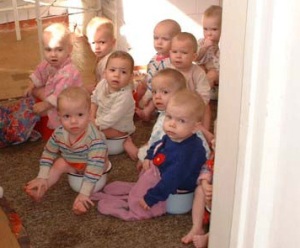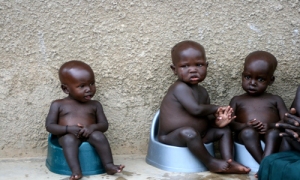Love Without Boundaries’ Amy Eldridge has been writing a series on her blog about “Realistic Expectations”. While it is geared toward families adopting from China, many of the issues are common in other countries as well. Today I read her post on toilet training and thought that there were many, many good points for any families adopting internationally! You can find it here: http://www.lwbcommunity.org/realistic-expectations-potty-training
I’d like to highlight a few of the issues she raises that are common to many other countries as well as China.
“Today we would like to continue with the “bathroom” subject, as one of the most common questions asked by parents is whether or not their child-to-be is potty trained. Well…… define potty trained. And if the definition is “Western style toilet trained,” then the answer is probably not…. In orphanages that do use potty chairs or ceramic pots for toilet training, many staff will say that a child is “potty trained” when what they mean is that all the children are lined up on potties several times a day. They might sit there for an hour at a time starting at a very young age, and during that time they happen to “go.” Scheduled potty time in Chinese orphanages is common, but that doesn’t always equate to a toddler being able to tell a new parent when he or she needs to use the bathroom, and so don’t get frustrated when there are accidents.” (underlines are mine)
This practice is certainly not limited to China. For example, it’s the usual for children being adopted from East European countries, India and some African countries as well.
Aside from the short-term issues (like helping a child acclimate to Western style toilets or managing parental expectations) there are sometimes long-term effects as well. In some cases this type of “toilet training” causes the child to fear elimination and toileting. Aside from the obvious signs of fear related to toileting, children will sometimes withhold urine or feces which can lead to physical complications, which in turn can start a cycle of fear, withholding and physical impact that can be hard to break.
Children who have spent time in less than optimal care (like and orphanage) often have a great need to control their environment. And, what better area of life to control than pottying? I mean, no one can truly make a child put their potty in the toilet short of abuse!
Add to these potential issues the fact that children who have spent time in less than optimal care also usually lag behind in one or more areas of development and there is huge potential for potty problems!
So, how do you know if you’re dealing with short term potty training issues or more long-term concerns? That’s a big question and we’ve started to address it in our course Transitions, Developmental Challenges or Just Regular Kid Stuff??? Although this is a recorded course now, it was given in a webinar format a couple of years ago. While many different behaviors were addressed, toilet training was one that was always raised in these live webinars!
Whether potty problems are stemming from fear, uncertainty, transitions, a need to control or a lag in development, special parenting is needed. Traditional toilet training strategies have the potential to backfire in a big way. Parenting that gets at the underlying issue rather than the symptom is called for and discussed at length in Because They Waited and in Discipline: Managing Your Child’s Bid for Power.






